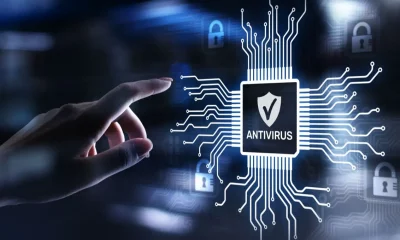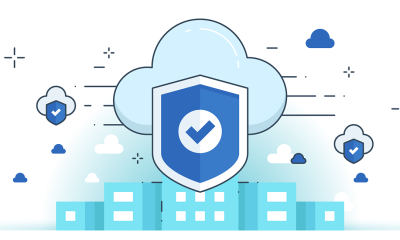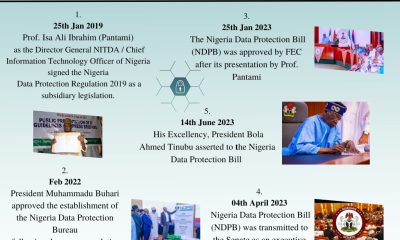Headline
6 Tips To Ensure Your Data Security

When discussing matters bordering data security, it is crucial to draw the dividing line between Privacy and security.
The due are the heroes of the data and information world — each regulates, supervises and protects user and organizational data.
Separately and together, these information standards are crucial to technological growth.
Premium protection services can help support privacy and security measures, both individually and collectively. Before investing in either, learn more about the differences between privacy and security, the role of compliance and how to protect yourself from unauthorized data collection.

6 Tips To Ensure Your Data Security
What Is Digital Privacy?
Digital privacy is an individual’s right to keep digital information —personal and professional — confidential. Most online users agree their privacy is worth protecting, especially when sensitive data is at risk.
There are multiple types of digital privacy, including:
- Information privacy
- Data privacy
Importance of Data Privacy
Data privacy is important for protecting the sensitive information of all online users. Various organizations — like Google, Facebook and Amazon — collect personal data like:
- Names
- Addresses
- Usernames
- Passwords
- Phone numbers
- Payment and card information
- Email addresses
- Driver’s license numbers
Prioritizing digital privacy can help protect vulnerable parties from dangerous actors, including hackers and other cybercriminals.
What Is Digital Security?
Digital security refers to the protections individuals and organizations take to defend their personal and professional information. Digital security is a broad topic, and there are a few distinct types of security that cover certain security measures and timelines:
- Cybersecurity: protection of data and information from unauthorized actors
- Data security: protection of data and information across its entire lifecycle
- Zero trust security: security framework that only allows access to authorized users
Security Without Privacy: Is It Possible?
Security without privacy is possible, but it’s difficult to achieve and is strongest when paired with digital privacy. Additionally, organizations can still share and sell user information — if included in their privacy policy — while supporting strong internal security systems. While privacy without security is nearly impossible to support, security without privacy is commonly maintained.
Which Is More Important?
Privacy and security are usually equally important, but compliance expectations and user or organizational priorities can affect the importance of each. Before assigning importance levels to privacy and security, understanding a standard’s levels of compliance is necessary.
If worse comes to worst, it’s usually best to consider privacy and security a collaboration rather than a competition — allowing each to support the other.

Data Security: 6 Tips To Ensure Your Privacy and Security Online
Privacy vs. security should be less of a competition and more of a supportive partnership. To support both, individuals and organizations can follow specific protection tips:
1. Browse With a VPN
Whether you want to access content prohibited in your country or want to protect your personal data with additional security, consider using a VPN. This type of security tool masks a public IP address and protects data from third-party actors. Even if a cybercriminal hacks your connection, a VPN will continue to protect and encrypt data.
2. Communicate With Encryption
Sharing sensitive data digitally isn’t recommended, but it can be protected through end-to-end encryption. Encryption stops eavesdropping cybercriminals from being able to read and record digital communication, protecting the privacy of the sender and receiver. Specific forms of encryption — like AES encryption and PGP encryption — can be used to protect data across specific platforms.
3. Limit Social Sharing
Individuals can protect their privacy and support individual security by limiting what they share on social platforms. A digital footprint — which is the trail of an individual’s online activity — can be traced. If a user shares private information like credit card numbers, passwords, legal names, addresses and phone numbers on social platforms, they can be tracked and stolen by cybercriminals.
4. Utilize a Password Manager
Digital password managers are security systems individuals and organizations can use to store and protect passwords. This type of security can be free or paid, and authorized users can pass internal information between themselves. Users also use password managers to store unique usernames and passwords for multiple accounts, which can also increase security and privacy.
5. Try Ad Blocking
For web surfers, it’s possible to download ad blockers and cookie-blocking extensions to protect personal data from unauthorized collection. However, it’s important to research potentially malicious browser extensions before downloading anything to a device.
6. Install Antivirus Software
Antivirus software options — for various devices like iPhones and Android — can help protect devices from data-stealing malware. Additionally, anti-malware software can alert users to potentially dangerous apps, websites and other software.
Other security precautions, like private search engines, can also help users support privacy and security. With specialized protective downloads from Panda Security, you can turn privacy vs. security from a competition into an individually beneficial collaboration.
Headline
Fagbemi warns against obstructing EFCC from performing its lawful duty

The Minister of Justice, Lateef Fagbemi, SAN has warned against obstructing the Economic and Financial Crimes Commission (EFCC) from carrying out its lawful duty .
Fagbemi’s warning is contained in a statement in Abuja.
“This is a matter of very grave concern, it is now beyond doubt that the EFCC is given power by the law to invite any person of interest to interact with them in the course of their investigations into any matter, regardless of status.
“Therefore, the least that we can all do when invited, is not to put any obstruction in the way of EFCC, but to honourably answer their invitation.
“A situation where public officials who are themselves subject of protection by law enforcement agents will set up a stratagem of obstruction to the civil and commendable efforts of the EFCC to perform its duty is to say the least, insufferably disquieting’’.
He added that running away from the law will not resolve issues at stake but only exacerbate them.
“Nigeria has a vibrant judicial system that is capable of protecting everyone who follows the rule of law in seeking protection.
“I therefore encourage anyone who has been invited by the EFCC or any other agency to immediately toe the path of decency and civility by honouring such invitation instead of embarking on a temporising self-help and escapism.
“This can only put our country in bad light before the rest of the world’’.
He said institutions of state should be allowed to function effectively and efficiently.
“I stand for the rule of law and will promptly call EFCC, and indeed any other agency to order when there is an indication of any transgressions of the fundamental rights of any Nigerian by any of the agencies’’.
NAN reports that the EFCC had on Wednesday warned members of the public that it was a criminal offence to obstruct officers of the Commission from carrying out their lawful duties.
Section 38(2)(a(b) of the EFCC Establishment Act makes it an offence to prevent officers of the Commission from carrying out their lawful duties. Culprits risk a jail term of not less than five years.
The warning , the EFCC said, became necessary against the background of the increasing tendency by persons and groups under investigation by the Commission to take the laws into their hands by recruiting thugs to obstruct lawful operations of the EFCC.
On several occasions, the anti graft agency said, operatives of the Commission have had to exercise utmost restraint in the face of such provocation to avoid a breakdown of law and order.
Headline
Unknown Gunmen Abduct Channelstv Reporter In Port-harcourt

Some unknown gunmen have kidnapped Joshua Rogers, the ChannelsTV reporter in Port-Harcourt, the Rivers State capital.
Politics Nigeria learnt that Rogers was picked up close to his residence at Rumuosi in Port Harcourt and to an unknown destination by the gunmen around 9pm on Thursday, April 11.
The reporter was driving his official ChannelsTV branded car when the hoodlums accosted, pointed a gun at him and took him away in the same vehicle.
Rogers was said to be returning from his official assignment in Government House after a trip to Andoni for a government event when the incident happened.
Already, the gunmen were said to have contacted his wife and demanded a N30million ransom for bis release.
His cameraman confirmed the incident and appealed to his abductors to set him free unconditionally.
-

 Business4 days ago
Business4 days agoSeplat Energy celebrates a decade of Dual Listing with Bell Ringing Ceremony at Nigerian Stock Exchange
-

 News4 days ago
News4 days agoBDCs now buying dollar at ₦980 — ABCON President
-

 Metro4 days ago
Metro4 days agoOsun Poly Student, Olanrewaju Olatona killed by hit-and-run one-way driver
-

 Headline4 days ago
Headline4 days agoFagbemi warns against obstructing EFCC from performing its lawful duty
-

 News4 days ago
News4 days agoLASG’s maize palliative impactful, says poultry association chair
-

 News4 days ago
News4 days agoWoman killed while crossing road in Anambra
















